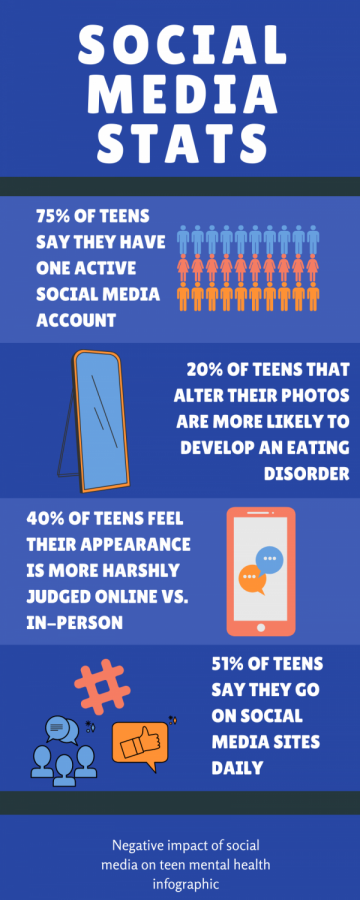Social media worsens teen mental health
Sources: American Academy of Child & Adolescent Psychiatry, CNN, and PR Newswire
January 19, 2021
Although social media has the power to bring people together, it can also tear people apart with bullying and harassment, which can lead to detrimental results, like eating disorders.
With Gen-Z having had early access to social media at young ages, their mental health can be greatly negatively affected.
According to the American Academy of Child and Adolescent Psychiatry, around 90% of teens ages 13-17 have used social media at least once. About 75% have reported having at least one active account and around 51% visit a social media site daily.
“I have 2,380 [Instagram] followers [and] I average around 800 likes per post,” freshman Sophia Taylor said.
Although there is no standard number of followers for any given teen on instagram, most personal accounts can range from less than 100 followers to over 1,000. Many students with large social media followings choose to use their platform to set positive examples for others.
“I keep highlights on my page promoting #OtherPeopleMatter, which my leadership class started last year,” Taylor said. “I think my Other People Matter posts help people feel included and represented.”
Although Taylor and some other accounts do their best to create an inclusive environment for their followers, there is still a dark side to social media.
“To me, the negatives of social media are all of the falsities,” Taylor said. “Incorrect statistics, fake news, photoshopped pictures and stuff like that. You never get 100% of the truth because anything can be tweaked.”
Social media is notorious for having fake news and spreading fake rumors or speculation on people, events, and more.
According to a survey by PR Newswire, 40% of teens on social media feel that their appearance is more harshly judged online than in person. Another 40% believe it’s challenging to show the person they want to be on social media. Trying to express themselves in the way they want on social media is hard for many teens because of the possible fear of getting made fun of.
Along with teens comparing their looks and bodies to others on social media, there are other aspects of some sites that tend to deteriorate a teen’s self-esteem. For example, followers and likes counts.
“I get close to 200 likes each [Instagram] post,” freshman Saaj Dhungana said. “When I get lower likes than normal, I get insecure. Then I look at my friend’s account which gets way more likes than I do and I just feel like I may not be pretty or popular enough. It sucks because I know I shouldn’t care but I do anyway.”
Small things such as likes can make impressionable teens feel like they aren’t enough and possibly causing long term effects.
To help with this, Instagram has created an update that prevents users from seeing how many likes other people have gotten on their posts. According to a MacPaw article, this update has only been released for some accounts due to it still being in the testing phase. But more and more people are seeing this feature on their accounts. Instagram has not made a statement on whether the update is permanent or not. Either way it’s still a great addition to help stop the comparison of follower and like numbers.
“Social media platforms where you can’t see the follower or like count always seem more relaxed and accepting to me,” Taylor said. “This would prevent people from comparing themselves to others, and overall make Instagram a happier, more easy-going environment.”
We live in a virtual world full of influencers that have millions of followers and likes just for matching an unattainable beauty standard. This can affect the people seeing these posts by making them think less of themselves and how they look, which may lead them to alter themselves before uploading pictures on social media sites.
A survey by CNN found that around 27% of university students edit their looks and bodies before posting on social media.
While tweaking how one looks in photos may seem harmless, this can actually have detrimental effects on others, a common one being eating disorders. Researchers show that those who posted altered photos were more likely to form an eating disorder. Eating disorders are one of the most common disorders in adolescence. It has been on the rise for teens over the last few years most likely due to the popularizing of social media.
“It sucks how I grew up with social media and I just got used to the feeling of not being enough due to being surrounded by all these people I compare myself to.” Dhungana said.




Chad • Feb 16, 2021 at 6:24 pm
I love the article Chloe!! keep up the amazing work!!